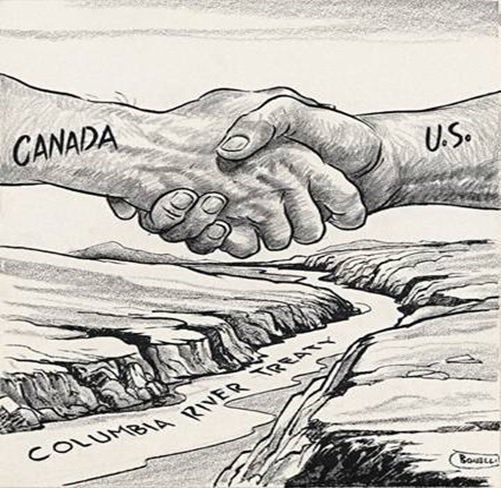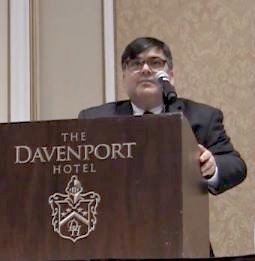Treaty Talks
Negotiations are about to begin on revising the Columbia River Treaty between the United States and Canada.
- April 27, 2018
- John Harrison

The public process to consider the future of the Columbia River Treaty between the United States and Canada got under way in Spokane last week with a speech by a U.S. State Department official, a panel discussion among treaty interests, and a town hall meeting presided over by the U.S. negotiating team. The team includes the chief U.S. State Department negotiator, Jill Smail, and representatives of the Bonneville Power Administration, Bureau of Reclamation, Army Corps of Engineers, and NOAA Fisheries.
Francisco “Paco” Palmieri, acting assistant secretary for the Bureau of Western Hemisphere Affairs in the State Department, whose responsibilities include the 1964 treaty, promised to “engage with the region” as negotiations get under way, likely this summer, and conduct periodic public meetings during the process. He spoke as part of the panel discussion on the future of the treaty at the Lake Roosevelt Forum conference in Spokane April 24 and 25.
“The brilliance of the treaty is to determine how we share resources for mutual benefits,” he said. “The treaty is seen around the world as a model of transboundary cooperation, and we hope it will continue as a model for many, many years to come.”
The 1964 treaty authorized the construction of three water-storage dams in the headwaters region of the Columbia River in British Columbia and the release of water from behind those dams coordinated by the United States and Canada to maximize hydropower production downstream in the United States. The treaty also authorized construction of Libby Dam on the Kootenai River in Montana, but it is operated separately from the other three. The treaty promises an equal share to Canada of the increased hydropower (the “Canadian Entitlement”), or its value if it is sold, and recently the annual payments to British Columbia of this amount, known as the “downstream power benefits” have been more than $100 million ($111 million for 2016/2017).
The treaty also provides flood protection to communities along the river, particularly in the United States. The flood control provisions of the treaty expire in 2024, 60 years after it was ratified, and new provisions become effective. At that point, flood control won’t be automatic but will be provided when Canada is “called upon” by the United States after storage dams in this country are maximized for flood control.
That could alter the timing and volume of water flowing into the United States, which could affect hydropower dam operations and also change the river environment, affecting fish and wildlife and their habitat.
At the evening town hall meeting, attended by about 125 people, Smail said the team would represent the United States and intended to pursue the regional recommendation as developed by the U.S. Entity and regional participants in 2013. The U.S. entity for treaty implementation consists of the Bonneville Power Administration and the Corps of Engineers. Tribal governments were included in the development of the regional recommendation but were not consulted about the original Treaty in the 1960s.
The regional recommendation calls for continuing the primary purposes of the treaty, hydropower and flood control, but also recognizes “… there is an opportunity for inclusion of certain additional ecosystem operations to expand, enhance, and complement … existing ecosystem investments as part of the post-2024 Treaty.”
While the regional recommendation recognizes but does not define “ecosystem benefits,” a coalition of Columbia River Basin tribes has defined it, in a June 2013 statement about the future of the treaty. In the tribes’ definition, ecosystem function includes a number of river operations to benefit fish and wildlife including, for example, increased spring and summer flows, higher and more stable storage reservoir levels, lower summer water temperatures, and reconnected floodplain habitats.
Ecosystem function and the makeup of the United States’ negotiating team dominated public comments at the Town Hall meeting. Many speakers including representatives of tribes and environmental groups supported the inclusion of ecosystem considerations in a “modernized treaty,” as Smail called it, and these same groups decried the lack of tribal representation on the negotiating team. Smail said the team would represent the United States and intended to pursue the regional recommendation as developed by the U.S. Entity and regional participants in 2013. Tribal governments were included in the development of the regional recommendation but were not consulted about the original Treaty in the 1960s.
Earlier in the day, at the Lake Roosevelt Forum conference where Palmieri spoke, eight invited panelists representing U.S. and Canadian tribes and economic, community, and environmental interests from both sides of the border noted the many things they hope to see authorized or delivered by a modernized treaty, from flood control to hydropower to irrigation to navigation and improved ecosystem conditions for fish and wildlife.
Panelist Tom Karier, eastern Washington member of the Northwest Power And Conservation Council, represented Washington Governor Jay Inslee in advising the U.S. Entity as it developed the 2013 regional recommendation.
“We’ve been working on the treaty for the last eight years,” Karier said. “The original treaty was simple – build dams, share benefits; but there were important omissions – the tribes, ecosystem function,” he said. “What is the objective of a new treaty? The issue today is not whether to build dams. The key question for the next treaty is how are those dams operated? If Canada operates them in way that is ideal for the U.S., we don’t need a treaty. The real objective is how do we identify a different set of operations that would benefit the U.S. and also Canada? We need to protect human health and safety; for the most part we need some storage upriver. We need certain flows to help salmon survive. We can work together to optimize power operations, and the power system can help mitigate climate-change impacts."
“The right answer is in the nuances,” Karier said.

Click here to see a video of Francisco Palmieri's remarks about the Columbia River Treaty at the Lake Roosevelt Forum conference.


